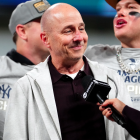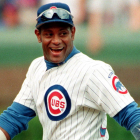
Dr. Keith Meister, the Texas Rangers' head physician and a member of Major League Baseball's task force focused on the sport's widespread arm woes, says he's proposed a radical rule change aimed at improving pitcher health: banning two-strike foul balls.
Dr. Meister disclosed his idea as part of an in-depth feature story by Mike Piellucci, the sports editor of D Magazine. Here's Piellucci's interpretation of Dr. Meister's idea:
If he's losing the battle, he's refusing to concede ground. He serves on an MLB task force investigating the injury epidemic, and he has proposed a rule to ban foul balls on two-strike counts, which would amount to the most dramatic change in how the game is played in decades. At first blush, it seems outlandish, then much less so as he bores into its potential to cut down pitch counts, push hitters to put more balls in play, and shorten games in one swoop.
The finer details of Dr. Meister's rule proposal are unclear. We asked Piellucci about his understanding of the rule, and he confirmed that he believes it would see all two-strike foul balls deemed strikeouts. If that sounds familiar, it's because that's how MLB handles fouled-off two-strike bunt attempts. (That wasn't always the case, either, as chronicled by our Matt Snyder back in 2018.)
To Dr. Meister's point, getting rid of prolonged at-bats would cut down on pitch count and game times across the board. (There were nearly 50,000 two-strike fouls this season.) It would also reduce the amount of certain pitch types thrown. Remember, Dr. Meister has previously blamed "designer pitches," like the sweeper and hard changeup, for the uptick in injuries; those pitches are often deployed when there's a K on the line. To wit, the league threw more than 30% breaking balls in two-strike counts this year, as opposed to 21% in no-strike counts and 24.2% in one-strike counts.
Of course, getting rid of two-strike fouls would fundamentally alter the game in so many different ways, and to the extent that the rule is unlikely to ever be seriously considered, let alone implemented.
Besides, most foul balls are not the result of intent or strategy. There are some hitters who pride themselves on being able to spoil tough pitches, but they would appear to be an exception rather than the rule. It stands to reason to think that most fouls are the product of a well-intended swing that just nicks the ball here or there. It seems perhaps overzealous to punish hitters for doing their best at a difficult job. You'd almost certainly see offense crater as a result of this change.
Conversely, pitchers would probably love the rule -- not because of the possible injury angle, but because it would make their jobs much easier. It should come as no surprise, then, that Piellucci quotes Dr. Meister saying: "I've even got Max Scherzer saying, 'You know, that's not such a bad idea.' And Max doesn't agree with anything."
On the whole? We appreciate Dr. Meister's out-of-the-box thinking on a subject that sorely needs more creativity if any ground is to be gained. We're just inclined to think this particular idea will never see the light of day.


















